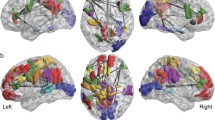Abstract
We think this is an open empirical question. A good analogy is the concept of general intelligence, which has been the focus of many recent neuroscience studies. It is ultimately an empirical question as to whether intelligence is best described as a single monolithic construct or in terms of narrower lower-order abilities (e.g., visuospatial ability, verbal intelligence, etc.). Some studies have found important brain structural and functional correlates of general intelligence, when treated as a monolithic construct (e.g., Thompson). However, other work has led potential to refinement or revision of the construct (e.g., placing focus on lower-level processes, such as interference control). The concept of arousal has received less attention in cognitive neuroscience research, but the situation may nevertheless be similar. Is there a monolithic arousal system in the brain? Perhaps not, just as few people would argue that there is a single “intelligence system”; on the other hand, we suspect that when arousal is operationalized in relatively general ways – e.g., in terms of individuals’ propensity to respond to emotional stimuli, their basal activity level, etc. – there will be identifiable neural correlates.
Access this chapter
Tax calculation will be finalised at checkout
Purchases are for personal use only
Similar content being viewed by others
References
Aston-Jones, G., & Cohen, J. D. (2005). An integrative theory of locus coeruleus–norepinephrine function: adaptive gain and optimal performance. Annual Review of Neuroscience, 28, 403–450.
Banfield, R. F., & Vohs, K. D. (2004). Handbook of self-regulation: research, theory, and applications. Guilford, New York
Basar, E. (2006). The theory of the whole-brain-work. International Journal of Psychophysiology 60(2):133–138
Bowden, E. M., Jung-Beeman, M., Fleck. J., & Kounios, J. (2005). New approaches to demystifying insight. Trends in Cognitive Sciences, 9, 322–328.
David, O., Harrison, L., & Friston, K. J. (2005). Modelling event-related responses in the brain. NeuroImage, 25:756–770
DeYoung, C. G., Peterson, J. B., & Higgins, D. M. (2005). Sources of openness/intellect: cognitive and neuropsychological correlates of the fifth factor of personality. Journal of Personality, 73, 825–858.
Fan, J., McCandliss, B. D., Fossella, J., Flombaum, J. I., & Posner, M. I. (2005). The activation of attentional networks. NeuroImage, 26, 471–479.
Fernandez-Duque, D., Baird, J. A., & Posner, M. I. (2000). Executive attention and metacognitive regulation. Consciousness and Cognition 9, 288–307.
Fink, A., Benedek, M., Grabner, R. H., Staudt, B., & Neubauer, A. C. (2007). Creativity meets neuroscience: experimental tasks for the neuroscientific study of creative thinking. Methods, 42, 68–76.
Friston, K. (2003). Learning and inference in the brain. Neural Networks, 16, 1325–1352.
Friston, K, & Stephan, K. E. (2007). Free energy and the brain. Synthese, 159, 417–458.
Ghiselli, E. E. (1966). The validity of occupational aptitude tests. Wiley, New York
Jaušovec, N., Jaušovec, K. (2007). Personality, gender and brain oscillations. International Journal of Psychophysiology, 66, 214–225.
Jung, R. E., & Haier, R. J. (2007). The parieto-frontal integration theory (P-FIT) of intelligence: converging neuroimaging evidence. Behavioral and Brain Sciences, 30, 135–154.
Klimesch, W., Sauseng, & P., Hanslmayr, S. (2007). EEG alpha oscillations: the inhibition-timing hypothesis. Brain Research Reviews, 53, 63–88.
Knyazev, G. G., & Slobodskaya, H. R. (2003). Personality trait of behavioral inhibition is associated with oscillatory systems reciprocal relationships. International Journal of Psychophysiology, 48, 247–261.
Kropotov, J. (2008). Quantitative EEG, event-related potentials and neurotherapy. Academic, San Diego, CA.
Locke, H. S., & Braver, T. S. (2008). Motivational influences on cognitive control: behavior, brain activation, and individual differences. Cognitive, Affective and Behavioral Neuroscience, 8(1), 99–112.
Neubauer, A. C., Fink, A., & Grabner, R.H. (2006). Sensitivity of alpha band ERD/ERS to individual differences in cognition. In: Neuper, C., Klimesch, W. (eds) Event-related dynamics of brain oscillations – Progress in brain research, vol 159. Elsevier, Amsterdam, pp 167–178.
Näätänen, R., & Michie, P.T. (1979). Early selective-attention effects on the evoked potential: a critical review and reinterpretation. Biological Psychology, 8(2), 81–136.
Neuper, C., Grabner, R. H., Fink, A., & Neubauer, A. C. (2005). Long-term stability and consistency of EEG event-related (de-)synchronization across different cognitive tasks. Clinical Neurophysiology, 116, 1681–1694.
Pochon, J. B., Levy, R., Fossati, P., Lehéricy, S., Poline, J. -B., & Pillon, B. et al (2002). The neural system that bridges reward and cognition in humans: an fMRI study. Proceedings of the National Academy of Sciences, 99, 5669–5674.
Posner, M. I., & Rothlart, M. K. (2007). Research on attention networks as a model for the integration of psychological science. Annual Review of Psychology, 58, 1–23.
Posner, M. I., DiGirolamo, G. J., & Fernandez-Duque, D. (1997). Brain mechanisms of cognitive skills. Consciousness and Cognition, 6(2–3), 267–90.
Postle, B. R. (2006). Working memory as an emergent property of the mind and brain. Neuroscience, 139, 23–38.
Simonov, P. V., Ershov, P. M., & Bastow, A. (1991). Temperament, character and personality: biobehavioral concepts in science, art, and social psychology. Taylor & Francis, New York.
Sokolov, E. N., Lyytinen, H., Spinks, J. A., & Näätänen, R. (2002). The orienting response in information processing. Lawrence Erlbaum, NJ.
Taylor, S. F., Welsh, R. C., Wager, T. D., Phan, K. L., Fitzgerald, K. D., & Gehring, W. J. (2004). A functional neuroimaging study of motivation and executive function. NeuroImage, 21, 1045–1054.
Author information
Authors and Affiliations
Corresponding author
Editor information
Editors and Affiliations
Rights and permissions
Copyright information
© 2010 Springer Science+Business Media, LLC
About this chapter
Cite this chapter
Braver, T.S. et al. (2010). Individual Differences in Cognition from a Neurophysiological Perspective: The Commentaries. In: Gruszka, A., Matthews, G., Szymura, B. (eds) Handbook of Individual Differences in Cognition. The Springer Series on Human Exceptionality. Springer, New York, NY. https://doi.org/10.1007/978-1-4419-1210-7_10
Download citation
DOI: https://doi.org/10.1007/978-1-4419-1210-7_10
Published:
Publisher Name: Springer, New York, NY
Print ISBN: 978-1-4419-1209-1
Online ISBN: 978-1-4419-1210-7
eBook Packages: Behavioral ScienceBehavioral Science and Psychology (R0)



